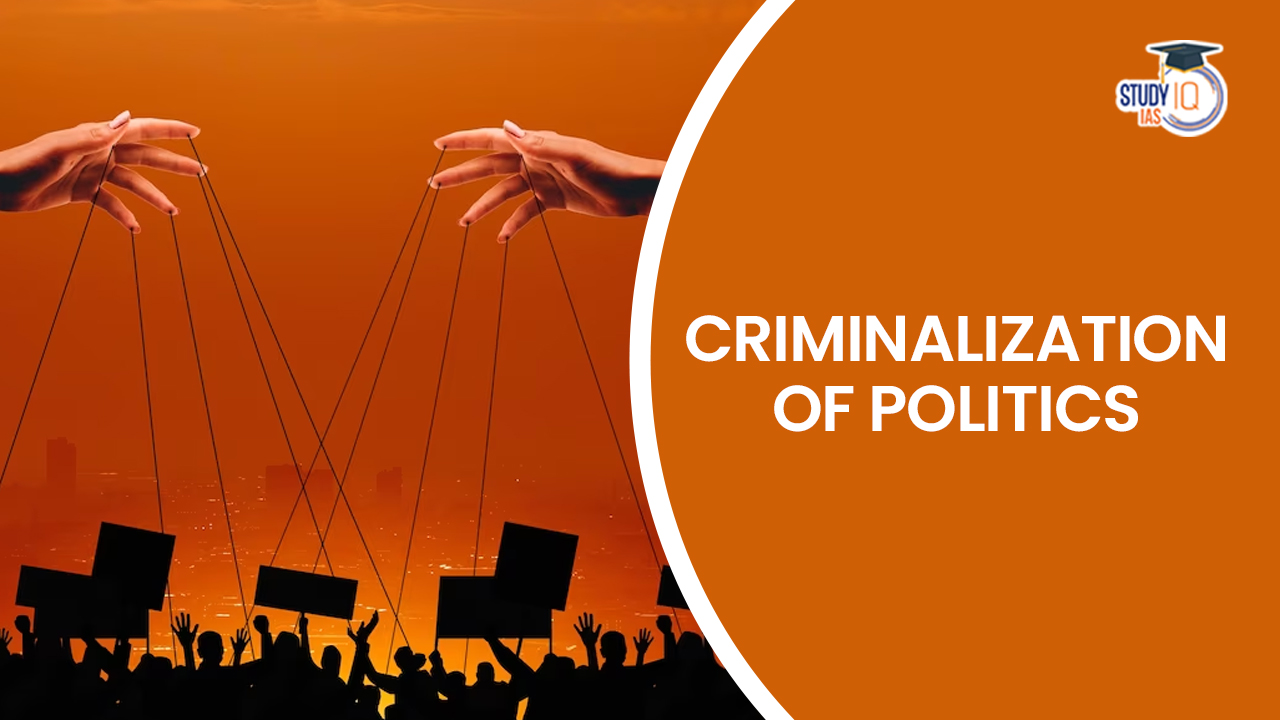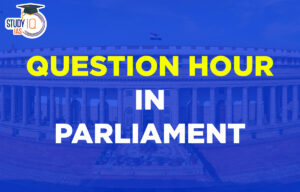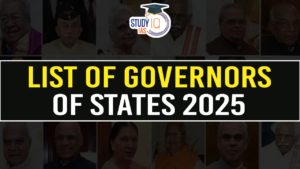Table of Contents
Context: The Supreme Court is currently hearing petitions seeking a lifetime ban on convicted individuals from contesting elections. It has sought a fresh response from ECI & Union Govt. on this matter.
What is Criminalization of Politics?
Politics in India is becoming more and more criminalized, which suggests a rise in the number of criminals and those facing criminal accusations. Additionally, this phrase refers to those with criminal histories who go on to become elected officials and delegates.
A person who has served a sentence of more than two years in prison is also ineligible to run for office until six years have passed since their release, according to Section 8 of the Indian Representative of People Act. However, this clause is ineffective in real life because of the ongoing criminalization of politics in India.
The Criminalization of Politics is an important part of Indian Polity which is an important subject in UPSC Syllabus. Students can also go for UPSC Mock Test to get more accuracy in their preparations.
Legal Provisions on Disqualification
Representation of the People Act, 1951 (RP Act, 1951)
- Section 8(3): Disqualifies a person convicted of a criminal offence and sentenced to at least two years of imprisonment from contesting elections. The disqualification lasts for six years after release.
- Section 8(1): Disqualifies persons convicted under laws for heinous crimes, including:
- Rape
- Untouchability under the Protection of Civil Rights (PCR) Act
- Unlawful activities under UAPA
- Corruption under the Prevention of Corruption Act
- These individuals remain disqualified for six years post-release, irrespective of their sentence duration.
- Section 11: Allows the Election Commission (EC) to remove or reduce the disqualification period of a convicted person.
- eg: In 2019, Prem Singh Tamang (Sikkim CM) had his disqualification period reduced from six years to 13 months, enabling him to contest a by-election despite being convicted under the Prevention of Corruption Act.
|
Supreme Court’s Past Judgments on Decriminalisation of Politics |
|
Election Data on Criminal Records
According to a 2024 ADR report:
- 251 MPs (46%) in the 543-member Lok Sabha have criminal cases against them.
- 171 MPs (31%) face serious criminal charges like rape, murder, attempt to murder, and kidnapping.
- Winning probability: Candidates with criminal backgrounds had a 4% chance of winning, while clean candidates had only a 4.4% chance.
Causes of Criminalization of Politics
Criminalization of politics occurs when individuals with criminal charges become politicians and are elected to office. This trend threatens democratic principles like fairness in elections, accountability, and the rule of law. The major causes include:
Lack of Strict Election Laws and Enforcement
- Weak laws and loopholes allow candidates with criminal backgrounds to contest elections.
- Delay in legal proceedings prevents swift action against offenders.
Use of Money and Muscle Power
- Politicians often rely on criminals for vote mobilization, booth capturing, and intimidation.
- Criminals enter politics to protect their illegal activities.
Voter Behavior and Lack of Awareness
- Some voters prioritize caste, religion, or short-term benefits over a candidate’s criminal record.
- Illiteracy and lack of awareness about ethical governance contribute to poor voting choices.
Political Patronage and Nexus with Crime
- Political parties often give tickets to winnable candidates, even if they have criminal backgrounds.
- Criminals provide financial and logistical support to parties in exchange for protection.
Ineffective Judiciary and Delayed Justice
- Slow trials and prolonged legal processes allow accused politicians to contest multiple elections.
- Low conviction rates fail to act as a deterrent.
Loopholes in the Electoral System
- Lack of stringent background checks before allowing candidates to contest elections.
- Failure to implement recommendations of election commissions and judiciary.
Weak Governance and Corruption
- Poor governance leads to a system where criminals can thrive.
- Bribery and nepotism allow criminals to manipulate administrative and legal processes.
Lack of Political Will for Reforms
- Politicians hesitate to bring reforms as they benefit from the existing system.
- Electoral reforms and strict decriminalization efforts face resistance.
Influence of Caste, Religion, and Regional Politics
- Candidates with criminal backgrounds exploit social divisions to gain support.
- Some parties use religious and caste-based politics to justify criminal candidates.
Lack of Accountability and Transparency
- Absence of stringent laws for disclosure of criminal records of candidates.
- Weak mechanisms to hold politicians accountable after elections.
Effects of Criminalization of Politics
The criminalization of politics harms democracy and the rule of law. It fosters corruption among politicians and weakens citizens’ trust in the political system. Effects:
- Development Stagnation: Politicians with criminal backgrounds may prioritize their interests over the community’s needs, hindering development.
- Weakening Institutions: Criminal elements can manipulate democratic institutions for personal gain.
- Impact on Elections: It limits voter choices, making it harder to find deserving candidates.
- Good Governance Issues: Elected officials with criminal ties undermine effective governance.
- Corruption Growth: The involvement of criminals increases black money in elections, leading to more corruption.
- Social Disharmony: This culture of violence can set a negative example for youth and decrease faith in democracy.
- Eroding Trust: Public confidence in politicians diminishes when they engage in criminal activities.
Consequences of Criminalization of Politics
The quality of India’s democracy is negatively impacted by the presence of people with criminal histories in the country’s politics and legal system. Due to extensive ties to the illegal underworld, huge sums of illegal money are funnelled into the political process.
The criminalization of politics has the consequence of limiting the legal process and increasing trial uncertainty. Criminals entering Indian politics increase crime in daily life. The executive, bureaucracy, legislature, and judiciary are among the state institutions that are badly impacted. Politics being made illegal displays a violent culture in the neighbourhood and is an example of young people.
Measures to Curb the Criminalization of Politics
Supreme Court Verdicts
- Association for Democratic Reforms v. Union of India (2002): The Supreme Court required all candidates for Parliament and State Legislatures to declare their criminal records and assets.
- Immediate Disqualification (Lily Thomas Case, 2013): The Court ruled that MPs and MLAs convicted of crimes would be immediately disqualified from office without a three-month appeal period.
- Fast Track Trials (2014): The Supreme Court mandated that trials for sitting MPs and MLAs must be completed within a year of charges being filed.
- Public Interest Foundation v. Union of India (2019): The Court ordered political parties to publish their candidates’ criminal records on websites, social media, and in newspapers.
Election Commission of India Actions
- Booth Capturing (1989): Rules were established to cancel or postpone elections in cases of booth capturing, where polling stations are seized or voters are threatened.
- Prohibition of Arms: Carrying weapons near polling stations is a serious offense.
- Curbing Muscle Power: The Election Commission has successfully limited the use of muscle power through strict enforcement of rules.
- Model Code of Conduct (MCC): This code is enforced by the Election Commission to ensure fair elections, using powers under Article 324.
- Affidavits: Candidates must declare their assets and criminal charges in affidavits to promote transparency before elections.
Criminalization of Politics Initiatives and Reforms
- Strengthening existing laws related to the criminalization of politics, expediting the resolution of criminal cases against politicians, and ensuring stricter eligibility criteria for candidates.
- Electoral reform like Encouraging inner-party democracy, transparent candidate selection processes, and stringent mechanisms to prevent the nomination of candidates with criminal backgrounds is needed.
- Promoting citizen engagement and voter education, encouraging voters to make informed choices and support clean and ethical candidates.
Criminalization of Politics and Role of the Judiciary
Highlight the significant role played by the Supreme Court in addressing the issue of criminalization in politics, including directives such as the disclosure of criminal records, barring individuals with criminal charges from contesting elections, and decriminalization efforts.
Criminalization of Politics UPSC
The criminalization of politics poses a grave threat to democracy and governance in India. It requires a multi-faceted approach involving legal reforms, electoral reforms, and increased public awareness to effectively address this menace. As UPSC aspirants, it is essential to understand and analyze this issue from various perspectives to contribute to the creation of a cleaner and more accountable political system. Students can read all the details related to UPSC by visiting the official website of StudyIQ UPSC Online Coaching.


 Question Hour in Parliament: Meaning, Ty...
Question Hour in Parliament: Meaning, Ty...
 List of Governor of States in India, Con...
List of Governor of States in India, Con...
 Maharashtra Bill to Curb Urban Naxalism,...
Maharashtra Bill to Curb Urban Naxalism,...





















